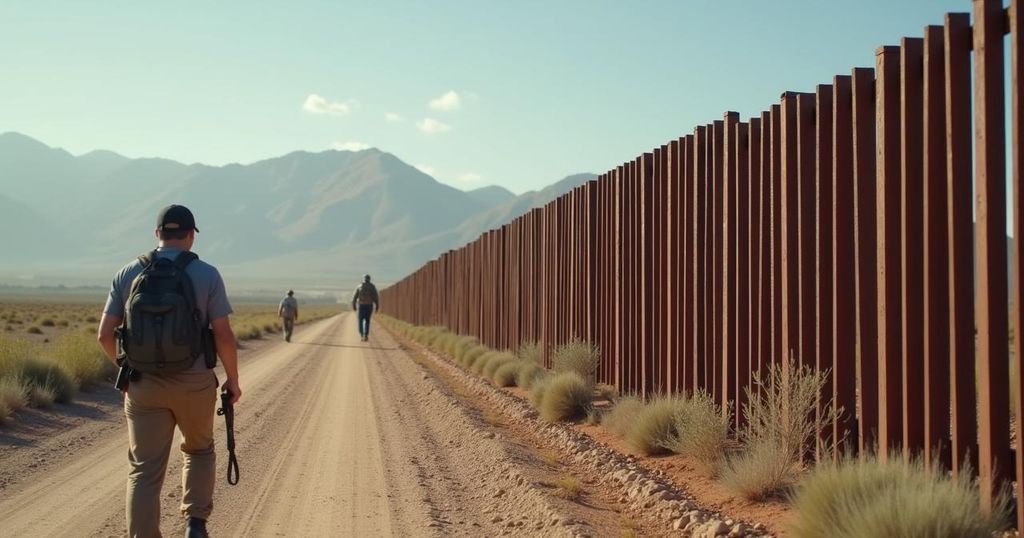As the U.S. election approaches, Mexico has heightened border enforcement, resulting in a significant drop in migrant crossings. This strategy stems from an unwritten agreement with the Biden administration, aiming to stabilize the border situation amid economic interests and political stakes. New enforcement measures have been implemented, impacting the journeys of many migrants, as Mexico maneuvers its role in the U.S. political context and addresses rising humanitarian concerns.
As the United States approaches its presidential election, Mexico has significantly intensified its border enforcement measures, resulting in a notable decrease in migrant crossings into the U.S. This shift is attributed to an implicit arrangement between the Biden administration and Mexican authorities, established late last year, aimed at maintaining order at the border and protecting economic interests tied to exports to the U.S. Analysts suggest that Mexico’s actions are motivated by the need to avert political risks associated with the upcoming election, particularly given the contentious nature of immigration policy in the U.S. political landscape. Under this informal agreement, the number of migrants reaching the U.S. border has dropped sharply from almost 250,000 in December to below 60,000 last month—the lowest monthly figure since the Trump presidency. At the same time, reports indicate a surge in migrant encounters within Mexico, as individuals attempting to traverse the country face intensified enforcement measures. Additionally, Mexico’s new administration, led by President Claudia Sheinbaum, is conscious of the potential implications of migration patterns on the U.S. election outcomes. Former Mexican ambassador to the U.S., Arturo Sarukhán, noted that while Mexico may not explicitly seek to influence U.S. voting behavior, they are strategically aiming to prevent an influx of migrants that could sway electoral sentiments in America. The experiences of families like the Sarmientos from Venezuela highlight the challenges faced by migrants in Mexico, as they navigate increased restrictions and enforcement designed to curb their journey to the U.S. border. Similar experiences of many others underscore a significant transformation of Mexico’s immigration policies, which increasingly appear to prioritize political leverage over humanitarian obligations, as suggested by policymakers and advocacy groups. Furthermore, the U.S. has played a role in shaping Mexico’s approach through both incentives and pressures, indicating a complex intertwining of politics and migration enforcement. The situation remains fluid, with questions regarding the durability of Mexico’s enforcement regimes under new leadership and its implications for future U.S.-Mexico relations. This strategic interdependence marks a new chapter in bilateral relations regarding migration, inevitably impacting the lives of countless individuals caught in the crossfire of political calculations and border security initiatives. Ultimately, the success of this enforcement strategy hinges on the continued cooperation between the U.S. and Mexico, especially as they navigate the intersecting realms of immigration policy, economic interests, and electoral dynamics.
The current focus on migration enforcement arises in the context of the upcoming U.S. presidential elections, wherein immigration issues remain a critical concern for both Republican and Democratic candidates. The Biden-Harris administration has recognized the implications of rising migrant numbers on political stability and public perception, prompting a need for strategic collaboration with Mexico. The porous U.S.-Mexico border has long been a contentious topic, influencing electoral prospects and prompting responses that often prioritize political expediency over humanitarian considerations. The partnership with Mexico forms a cornerstone of the Biden administration’s approach to border control, with an emphasis on reducing illegal crossings through a combination of diplomatic negotiations and increased enforcement measures.
In conclusion, the intensification of border enforcement by Mexico, amidst a backdrop of political dynamics surrounding the U.S. elections, illustrates a complex interplay between migration policy and electoral strategies. The implications of these policies are profound, affecting migrants directly while also reflecting broader U.S.-Mexico relations. The extent to which these measures will persist under the new administration in Mexico and continue to shape the migrant experience remains uncertain, but the current trajectory suggests an ongoing emphasis on maintaining control at the border while navigating the sensitive political landscape ahead.
Original Source: www.usatoday.com






